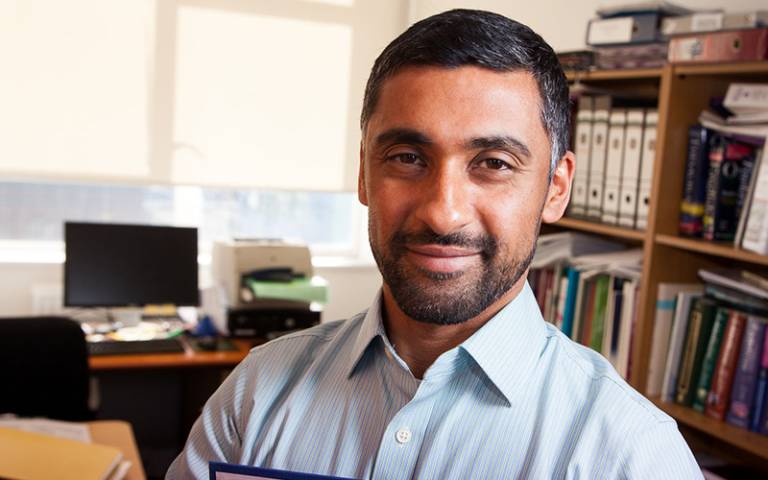Spotlight on... Allan Hackshaw
1 February 2024
This week, to mark World Cancer Day on 4 February, we meet Allan Hackshaw, Professor of Epidemiology and Medical Statistics at the UCL Cancer Institute. Allan chats to us about his current research into the potential implementation of multicancer early detection blood tests.

What is your role and what does it involve?
I am Professor of Epidemiology and Medical Statistics, and Director of the Cancer Research UK & UCL Cancer Trials Centre, within the UCL Cancer Institute. I design, conduct, analyse and interpret clinical studies and systematic reviews associated with evaluating cancer therapies and cancer screening technologies. Sometimes this involves finding more effective ways of treating cancers (drugs, surgery and radiotherapy), or reducing treatments to make them safer and more tolerable.
One of the best parts of this role is working with people from a wide variety of scientific disciplines within the UK and internationally, and always learning new things from them. There is also a fantastic group of colleagues in the trials centre, several of whom have been here for many years and we have grown older together.
It has been a great pleasure to have taught many undergraduate and postgraduate students: challenging their thinking and being challenged by them are equally important.
The mix of teaching, writing, travel abroad for meetings and conferences, and the ability to undertake research that interests you as well as funded research makes working for a large UK university so appealing.
How long have you been at UCL and what was your previous role?
I have been at UCL since 2003 - how time flies! Previously I was at the Wolfson Institute of Preventive Medicine (Barts Medical and Dental School), where I had been fortunate to start working with an excellent high-profile medical researcher, Professor Sir Nick Wald. This involved research in a variety of disciplines, such as tobacco and health, preventive therapies for disorders in pregnancy, cardiovascular disease, and screening for abnormalities in pregnancy and for disorders in adults such as cancer. There was a rigorous approach towards research and how to interpret it well that still strongly influences my work today.
What working achievement or initiative are you most proud of?
One favourite project was compiling the evidence on passive smoking and lung cancer that was used by the UK government to implement the ban on smoking in public places. The evidence synthesis had to be rock solid and I also learned about law, ethics and how powerful the tobacco industry was; and how to spot when data or results are being manipulated in a biased way. I remember when smoking was allowed almost everywhere in society, then in a short space of time it was not; with academic scientific work playing a key role.
Another favourite project was working with two fantastic oncologists (Clive Harmer and Ujjal Mallick, with whom I am now good friends) to establish the UK’s first ever national randomised trial in thyroid cancer. It led to a change in clinical practice internationally meaning many patients can have a shorter and safer treatment than the standard of care that had been in place for decades.
Tell us about a project you are working on now which is top of your to-do list
A major current interest of mine is in the evaluation and potential implementation of multicancer early detection (MCED) blood tests, using various studies at or external to UCL. For years, there has only been one screening test for one type of cancer, but by making use of modern and cheaper genetic sequencing technologies a single simple-to-take blood test can potentially find multiple cancer types. This is fascinating stuff. If such tests turn out to be effective, worthwhile and affordable they could increase access to cancer screening across geographically and socioeconomically diverse people, in wealthy and less wealthy countries.
What is your favourite film and novel?
The first Alien film is towards the top of the list, for its groundbreaking characteristics. It’s amazing that something so advanced looking was made in 1979. My favourite author is Thomas Hardy, who had a wonderful insight into how people behave and interact with each other, allowing him to describe those behaviours meticulously. Far from the Madding Crowd is probably my favourite novel.
What is your favourite joke (pre-watershed)?
Many of the funniest jokes are post-watershed, but I liked this one from the Edinburgh Fringe Festival: “Nationwide must have looked pretty silly when they opened their first branch”, by William Stone.
Who would be your dream dinner guests?
Noam Chomsky, Jeremy Paxman, the late Ruth Bader Ginsberg and Donald Trump….to see how much fur flies!
What advice would you give your younger self?
To have travelled more to distant places.
What would it surprise people to know about you?
That I love underwater plant and animal life but hate swimming.
What is your favourite place?
London, because of the huge variety of restaurants and so many cuisines, cinemas, theatres, museums, etc. Hardly any other big city worldwide comes close (possibly Vancouver).
 Close
Close

